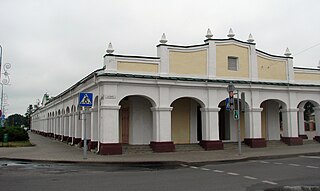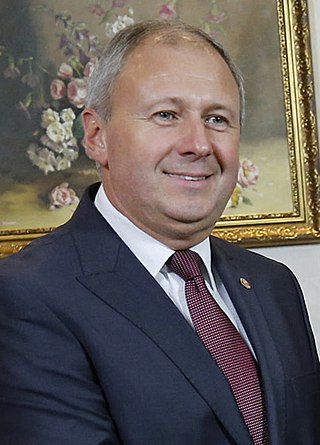
The Armed Forces of the Republic of Belarus are the military forces of Belarus. It consists of the Ground Forces and the Air Force and Air Defence Forces, all under the command of the Ministry of Defence. As a landlocked country, Belarus has no navy, however the Belarusian military does have control over some small Soviet inherited naval vessels in its rivers and lakes.

Yakub Kolas, real name Kanstantsin Mikhailovich Mitskievich was a Belarusian writer, dramatist, poet and translator. People's Poet of the Byelorussian SSR (1926), member (1928) and vice-president of the Belarusian Academy of Sciences.

Salihorsk or Soligorsk is a city in Minsk Region, Belarus. It serves as the administrative center of Salihorsk District. As of 2023, it has a population of 98,590.

Pavel Ivanovich Prudnikau was a Belarusian writer. He was a cousin of another Belarusian writer, Ales Prudnikau.

Bielyja Lauki is a shopping arcade and now a monument to civic architecture of the 19th century in Pruzhany town, Brest Voblast (province), Western Belarus. It was constructed in 1867 by the architects Mikhailousky and Savich.
VAL is a Belarusian band comprising Valeria Gribusova and Vladislav Pashkevich.

The Administrative Building of Rostov (Warsaw) University is a building in Rostov-on-Don constructed in 1897. Initially it formed a part of the Nikolaev City Hospital building complex. From 1915 it housed the Medical Faculty of the University of Warsaw, which had been evacuated to Rostov-on-Don during the First World War. It currently houses the administration of Rostov State Medical University and has the status of an object of cultural heritage of Russia of regional significance.

Syarhey Mikalayevich Rumas is a Belarusian politician and economist who served as Prime Minister of Belarus from 18 August 2018 to 3 June 2020.

The Minsk trolleybus system serves the city of Minsk, the capital of Belarus. The system was opened in September 19, 1952. Nowadays it has more than 60 lines. The system is operated by the "Minsktrans" state enterprise. According to the Transportation Research Board, trolleybus system of Minsk is the second largest in the world.

Olga Chupris is a Belarusian lawyer, deputy head of the Presidential Administration of Belarus.

The Russification of Belarus denotes a historical process where the integration of Russian language and culture increasingly influenced Belarusian society, especially during the 20th century.

Nina Baginskaya is a Belarusian human rights activist, public figure, and geologist.
Danuta Ivanovna Bichel-Zagnetova is a Belarusian poetess. She is Laureate of the Kupala State Prize of the BSSR (1984) for a collection of poems "Where to Walk Barefoot."

Batlejka is a Belarusian amateur puppet theatre. Its name is derived from the city of Bethlehem and performances are traditionally given over the Christmas period.

Belarus–NATO relations refers to relations between the Republic of Belarus and the North Atlantic Treaty Organization (NATO).
Tamara Alpeyeva, née Tamara Lameka ; born on March 23, 1949) is a Belarusian philosopher, culturologist and rector. She is an academician of the International Personnel Academy.

The German occupation of Byelorussia, now known as Belarus, started with Germany's invasion of the Russian Empire on August 1, 1914 and ended with the collapse of the German Empire on November 11, 1918. During the occupation, 130,000 Belarusians were killed.

Adam Maldzis was a Belarusian historian, literary critic, author and journalist. He was described as "a patriarch of Belarusian humanities", "an excellent connoisseur of literature" and "a living bridge between Belarus and the scholars of Belarusian studies around the world". He was “the author of unique studies of the Old Belarusian literature”.
Alexey Valeryevich Dzermant, sometimes published as Derman, also Dermant or Dzermanis — is a Belarusian philosopher, journalist and political observer, characterized in non-governmental media as a pro-government political analyst. Until the early 2010s, he was an activist of the neo-pagan movement; currently he is an Orthodox Christian and staunch supporter of Eurasianism.














